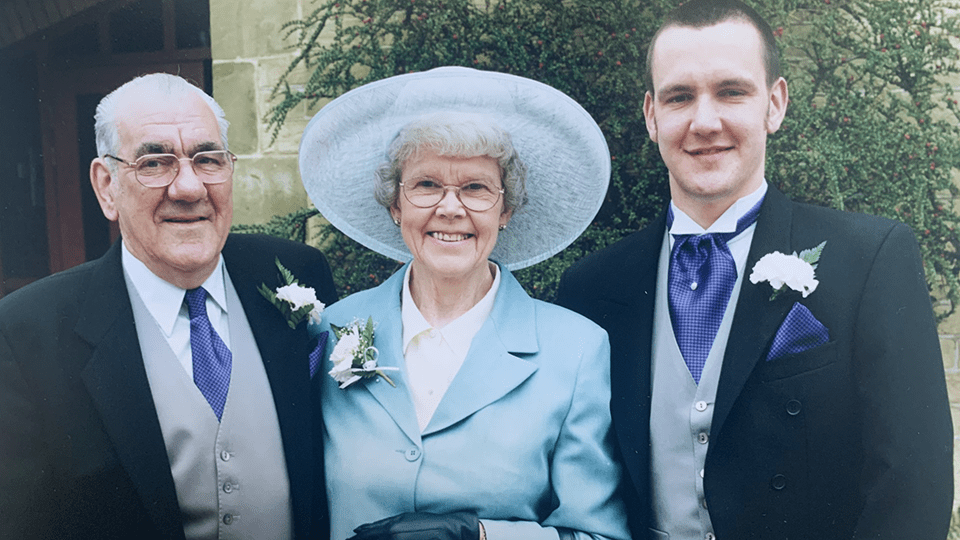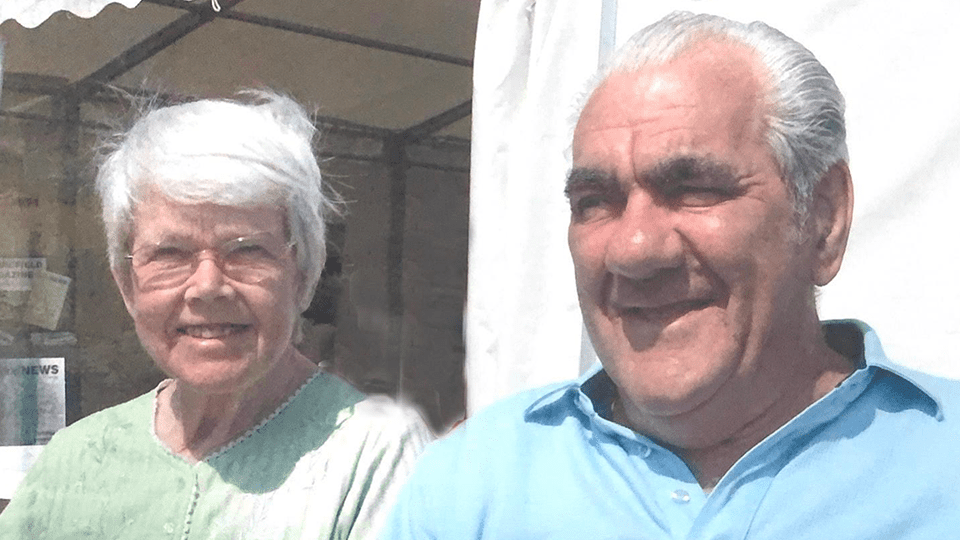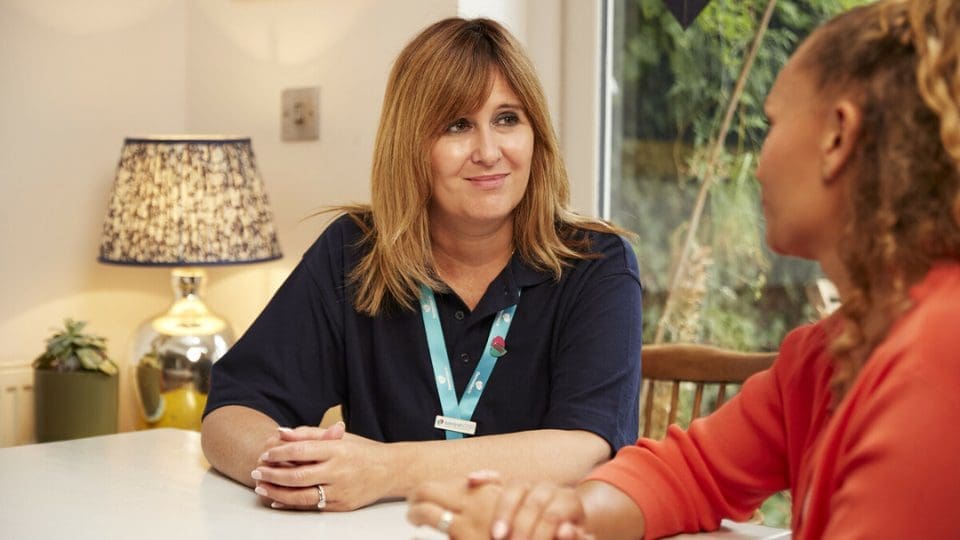
My first encounter with dementia was in 2012, when my dad started to show symptoms. He was in his seventies and on top of a host of other health issues, he began to experience hallucinations. It was particularly distressing for Mum as he would show signs of aggression that were so out of character for him.
I’m an only child and we have very little extended family, so my wife and I assumed a caring role without any real discussion. I was in my mid-thirties at the time, working full-time in emergency services, while my wife juggled two jobs of her own. We also had a six-year-old son. To say it was a big adjustment is an understatement.
My dad’s experience with vascular dementia
After Dad’s diagnosis of vascular dementia, it was a nightmare trying to navigate the support system. I didn’t know where to turn for help.
Meanwhile, Dad’s condition was getting worse. He had started running away from the house and on one occasion we had to call the police and report him missing. I knew he needed to go into full-time care, and after some hesitation, Mum agreed. He was there for around a year before passing away in May 2013.
I recall that time as being incredibly sad and frustrating. Sad because I was losing my dad. Frustrating because the support was almost non-existent.
I remember medical staff in hospitals having no idea how to talk to someone with dementia. When Dad was confused and agitated, some staff would respond angrily back at him and even try to argue with him. We know now this is one of the worst things you can do for someone with dementia.
Doctors didn’t even tell Dad he could no longer drive. It was left to me to take the car away from him as I knew he was very unsafe behind the wheel.
Mum’s diagnosis of Alzheimer’s disease
Fast forward to January 2015.
Mum forgot to call me for my birthday. Then she didn’t turn up for church – two things that were very unusual. When I called her to see if she was okay, she just told me, “I’m not sure, I feel a little odd.”
I had a terrible feeling that I knew what was coming.
In the ensuing months, Mum became more forgetful and would repeat questions. She also forgot how to use things like the phone and TV remote, often mistaking one for the other. While Dad’s dementia was very much characterised by erratic and difficult behaviour, Mum’s was predominately memory-based.

A GP appointment led to a consultation with a mental health team and exactly one year after she forgot my birthday, Mum was diagnosed with Alzheimer’s disease.
I’ll never forget that day. We received the diagnosis, were ushered into a room, given a bunch of leaflets and a few minutes later we were driving home. Life-altering news was delivered as if it were a routine check-up. In the car on the way home I turned to Mum and said, “How do you feel?”
She responded with, “I’m just relieved I don’t have dementia.”
None of what the doctors had said had got through to her.
Meeting Nicky, our Admiral Nurse
Mum was a very independent person who was always active. We didn’t even entertain the idea of full-time care. I got a telecare system installed so that at the very least, Mum could push a button if she had a fall, and I would be alerted. But over the next six months, she would often get confused at night and press the button, only for me to race over and find her fast asleep or forgetting that she’d pressed it. This would happen most nights, sometimes multiple times.
I had reached breaking point. I was so exhausted, emotionally and mentally. I had to have an extended period off work because I just wasn’t coping.
It was at this time that Nicky, a dementia specialist Admiral Nurse, came into our lives. I don’t know what we would’ve done without her. I was at the point I had been with Dad years earlier – not knowing who to contact, or how. And dealing with the endless frustration of not having calls returned, waiting times dragging on for months, or support services not communicating with each other.
Nicky got things moving. She knew what to say, and who to say it to. She has just been amazing for me and my wife.
Gaps in dementia knowledge within the hospital setting
In early 2018, Mum had a stroke and had to be rushed to hospital. Unfortunately I was again exposed to gaps in dementia knowledge within the hospital setting. Staff struggled to differentiate the effects of the stroke from the symptoms of dementia, and would often talk to her as if the latter were non-existent. We would have loved to have someone in the room who understood dementia and its complexities.
What had become very clear to all of us was that Mum could no longer live at home.
Finding a bed in a care home is far from a straightforward process. I had to sell Mum’s house to finance the care fees – I had never sold a house before. The local authority gave me 12 weeks to sell the house and I was chased by both the care home and local authority towards the end of those 12 weeks to start paying the full care fees. They even suggested that I take out a loan to pay the first invoice.
It seemed like just when I couldn’t get any more stressed, another layer was added.
Once again, I’m so grateful that we had the support of Nicky throughout this period. It was as much emotional support as practical. Without her, I don’t know how we would have managed.
In February 2024, Mum passed away. As sad as it was, I had done my grieving over a number of years as Mum became less of herself.
Nobody should have to experience what we have experienced
It’s been a long journey, and stressful beyond words. It’s taken a huge toll on my mental health. I won’t ever be the same as I was before this ordeal started with Dad all those years ago.
Other than Nicky, and a local carers charity, the support was hopelessly lacking. From diagnosis to care to navigating financial support and everything in between, so many times I’ve felt like I’ve been left to fend for myself. Or worse, that I’m actually having to fight with the people who are meant to be offering support!
I truly hope that the system changes for other families out there and they don’t experience what I did with my parents.
We know that dementia care can be fixed. Join us and urge the new Government to transform dementia care so that everyone affected by dementia gets the specialist support they need. Find out more here.




